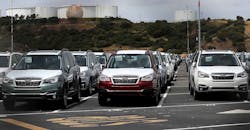Trump Takes Heat on Car Tariffs as Industry Warns of Job Losses
Companies and governments from Europe to Asia are warning President Donald Trump that tariffs on car imports would hurt the U.S. economy, disrupt the global auto industry, and widen the rift between America and its closest allies.
Auto groups, industry workers and foreign governments condemned the idea of raising duties on cars at a public hearing Thursday in Washington. Speaker after speaker urged the administration to avoid sideswiping the very industry it wants to help. To drive home their point, autoworkers from Alabama to South Carolina pulled up to the U.S. Capitol in vehicles they helped build.
“The importation of motor-vehicle parts is not a risk to our national security,” Ann Wilson, senior vice president of government affairs of the Motor and Equipment Manufacturers Association, told U.S. officials at the hearing. “However, the imposition of tariffs is a risk to our economic security that jeopardizes supplier jobs and investments in the United States.”
The Commerce Department held the hearing as it probes whether imports of passenger vehicles imperil U.S. national security. The administration has received limited support for the idea that foreign cars undermine America’s ability to defend itself.
That’s a stark contrast from the U.S. investigation into steel and aluminum imports earlier this year. In that case, American steel producers and steelworker unions lobbied for tariffs, giving Trump political cover to slap duties eventually on foreign shipments.
But Trump gave no indication he plans to back down from a brewing trade war that has roiled financial markets and threatened to undermine the strongest global upswing in years. In an interview with CNBC, the president complained that declines in the euro and yuan are putting the U.S. economy at a disadvantage.
Commerce Secretary Wilbur Ross opened the hearing seeking to dispel the notion that the Trump administration has made up its mind. His department received nearly 2,300 written submissions from industry groups, unions, foreign governments and individuals commenting on the investigation. The head of one major carmakers’ trade group said only three substantive comments supported tariffs.
“It’s clearly too early now to say if this investigation will ultimately result in a Section 232 recommendation on national security grounds, as we did earlier with steel and aluminum,” Ross said. “But President Trump does understand how indispensable the U.S. automobile industry is.”
The stakes are high for the world economy and the global auto industry. In recent weeks, investors have been focused on the potential impact of U.S. tariffs on Chinese imports. But tariffs on car imports could do even more damage -- more than double the amount of all other U.S. tariffs already implemented or proposed, according the International Monetary Fund.
A U.S. crackdown on foreign cars would further strain relations with allies such as Germany and Canada as Trump questions pillars of the Western order such as the Group of Seven and NATO. The president is scheduled to meet European Commission President Jean-Claude Juncker next week as Europe pushes for a global deal to cut auto tariffs.
The European Union is preparing a new list of American goods to hit with protective measures if Juncker’s mission to Washington fails to persuade Trump to forgo tariffs on cars. The bloc may target American goods worth about 20% of the U.S. action, according to two officials with knowledge of the deliberations.
With midterm elections in Congress looming in November, members of Trump’s own Republican party are pleading with him to avoid duties on cars. In a letter released Wednesday, 149 lawmakers from both parties urged the administration to drop the car probe, arguing that imports don’t pose a security risk.
None of this may deter the president. Last month, Trump threatened to slap tariffs of 20% on all cars coming into the U.S. from the EU. On a trip overseas last week, the president called the EU a “foe” on trade issues. His latest criticism came Thursday.
“The European Union just slapped a Five Billion Dollar fine on one of our great companies, Google. They truly have taken advantage of the U.S., but not for long!" Trump tweeted as the hearing got under way.
An auto trade war would deal a body blow to car makers from General Motors Co. to Toyota Motor Corp., which have fine-tuned their supply chains to take advantage of countries with low duties, such as the U.S. America’s trade in cars and car parts with the rest of the world amounted to more than $470 billion last year. The nation imported about $135 billion more in passenger cars than exported.
Speakers representing more than 40 auto-industry groups and foreign governments spoke Thursday, from the American Automotive Policy Council to the EU.
Foreign governments such as Japan and South Korea noted that automakers headquartered in their nations have extensive U.S. operations, including manufacturing plants. “Japanese automakers have been playing a vital role in creating many jobs and supporting the growth of the U.S. manufacturing base,’ said Kazutoshi Aikawa, deputy chief of mission at the Japanese embassy.
The strongest case for protecting the U.S. industry came from the United Auto Workers. Offshoring to low-wage countries including Mexico and China has hollowed out production in the U.S., and more autoworkers risk losing their jobs as the industry shifts to electric vehicles, said the union’s research director, Jennifer Kelly. She called for “targeted” actions to encourage investment in U.S. manufacturing.
Commerce has until February to report its findings to Trump, who has the final say on any tariffs. The probe covers imports of automobiles, including SUVs, vans and light trucks, and auto parts. The administration is reviewing the security impact under Section 232 of the 1962 Trade Expansion Act, the same provision the president used to impose steel and aluminum tariffs.
By Ryan Beene, Gabrielle Coppola and Andrew Mayeda
About the Author
Bloomberg
Licensed content from Bloomberg, copyright 2016.
